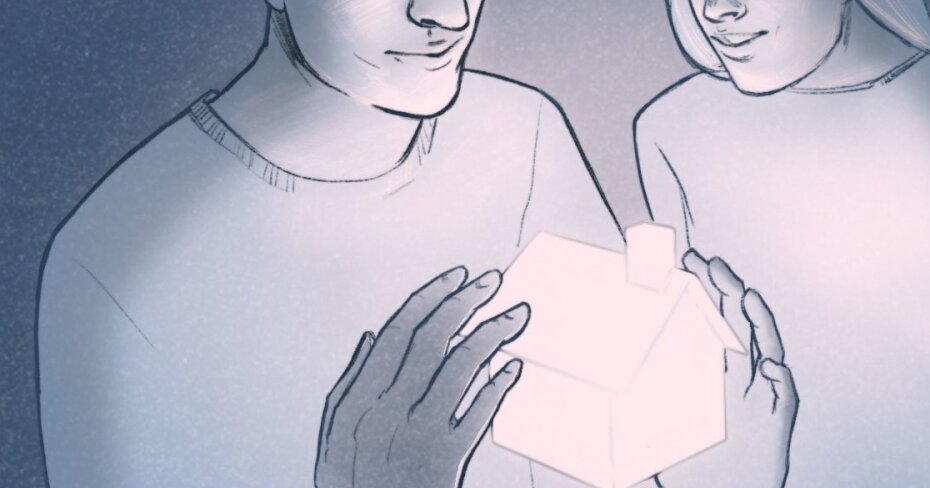Are Canadians too obsessed with homeownership?
By: Janine Rogan on August 21, 2017
Nearly 70% of Canadians own a home, which is staggering considering how expensive it is to enter some of Canada’s hottest markets. Rebecca, a 24-year-old medical student from Calgary, just became part of this statistic.
As a newly married couple, her and her husband purchased a condo within walking distance to her university. Because she was starting med school this year, the pair felt they needed to live as close as possible to her university — commuting can be unpredictable and stressful. For Rebecca, location was a major consideration. The couple looked at renting a three-bedroom condo in the same complex, and had a hard time swallowing the $2,000+ price tag. Her husband, Nate, needs a separate space for his work, which is why they needed the extra space.
With help from their parents, Rebecca and Nate were able to pull together a 20% down payment on the place after negotiating the price down by $8,000. This allowed the couple to secure a five-year fixed rate of 2.54%.
“We feel very fortunate we had help to be able to put down 20%,” Rebecca says. “Without that, we wouldn’t have considered it”.
While 70% of Canadian households own their homes, that doesn’t seem to be the case in other places around the world. The United Kingdom has seen a decrease in their homeownership rates, dropping to 63% in 2016 and Switzerland has only 43% of their households owning their home.
So, should homeownership be the Canadian Dream?
Alex Avery, a real estate analyst and the the author of The Wealthy Renter, says there are a number of factors that lead Canadians into home purchases that they might not be ready for. The first is the large lobby group that promotes homeownership. This can be anyone from real estate agents, to mortgage brokers, Canadian banks, and the Government. These groups do a great job of glorifying homeownership and promoting it as a sound investment.
“In a lot of cases parents, friends, and coworkers have done well and made money on their home purchases, and a lot of them lack experience of investing in the stock market,” Avery says. “When 70% of families own homes, and prices go up, they think they have made a good choice, they want people to buy into the same investment strategy they have fallen into.”
For Rebecca and Nate, buying made sense. They noticed that, while looking at Calgary’s depressed market, condos were priced at the lowest they had been for the past 10 years.
But in many situations, young couples, as well as single working professionals, jump into homeownership before they are ready. If disaster were to hit and you are renting you have the option to sublet (or in some cases move out if you’re month-to-month) while you search for cheaper accommodations.With a mortgage, you are stuck with the legal liability to pay the bank. If you have to walk away from your home, all that hard earned “equity” vanishes.
Rebecca shared that a number of her friends have made homeownership their goal, and dream, but Rebecca felt that because she was going to be in school for so long, her dreams didn’t follow as traditionally as some of her friends might. Homeownership wasn’t something Rebecca and Nate deemed a priority, but they still ended up purchasing a home in one of Canada’s most expensive real estate markets with an expensive medical degree to pay for over the next few years.
Homeownership has also been glamorized by television and house flipping shows, which leads Canadians to believe that buying a home is the way to go.
What many people forget is that home prices are cyclical. “Toronto and Vancouver have seen incredibly hot markets, with prices rising more than 30% in a given year.” Avery says. “Millionaires are created overnight and on paper because of the jump in prices, and no one ever thinks that the prices will go down. Real estate cycles can last a very long time, sometimes 30 or more years, and people don’t have the innate ability to assess things with long cycles.”
The problem with more and more Canadians entering the market is that when things turn sour, they may turn dramatically, which could be devastating for so many households.
“Really, there is no good outcome for hot markets,” Avery says.
“If house prices keep going up, we will have a bifurcated society with two types of people; people who have wealth and those who are left behind. If you want in, it’s too expensive, and the more people are putting into houses the less they can put into the economy.”
“If housing prices stay flat, young people will continue to buy, and they become house poor — maybe for their entire life,” Avery says.
Taking on six-figures of debt can mean your monthly payments are unbearable.
“Lastly, if house prices come down, then the wealth will come down as well.”
Meaning, if buyers get caught in a downturn, they may face the prospect of being underwater on their home — where their mortgage is larger than the actual value of their property.
People are quick to jump into homeownership, even though it’s the largest purchase they will make in their life. In addition, it’s easier for them to have “investment creep” come into play. Avery explained this as the ability to justify purchasing more house because “it’s an investment”, even though the decision is purely based on consumption.
“No one is ever going to talk you out of buying more house,” Avery says. “But granite countertops are a purchase driven by consumption, not investment.”
Owning a home is a measure of success that many Canadians strive to achieve; leading many to jump into homeownership before they are ready. For many who’ve made this decision in the past 30 years, it’s paid off.
But there are warning signs that we may want to rethink our homeownership obsession. In the late 1980’s, the average home in Toronto doubled in value in a few short years — before crashing by more than 40%. Prices, adjusted for inflation, did not return to the levels seen in the late 1980s until very recently.
Toronto once again looks to be in a precarious spot. Prices for the average home in the city have declined more than $174,000 in the past three months, following new government rules.
If anything, these examples should remind Canadians that home prices are not guaranteed to go up, and these investments are cyclical like anything else. Canadians looking to buy a home should be doing so because they see it as a fundamental part of their lives for an extended period of time — and not only because they feel like everyone else is buying one as well.
432e.jpg)
b188.jpg)
